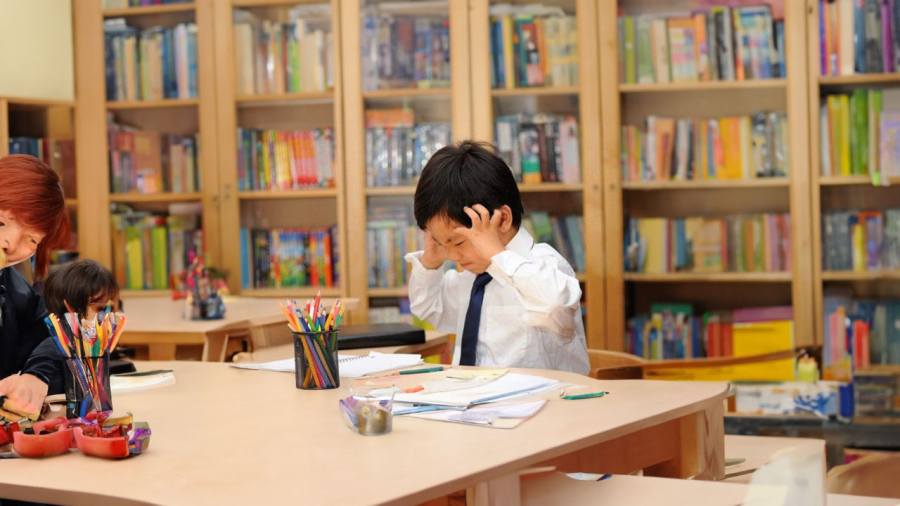The following story might shock many parents. The reality is that there are many highly capable parents who struggle to teach their children, resulting in their children being unmotivated to study and achieving poor academic performance. On the other hand, there are many families where the parents, who have little education, are unable to teach their children, but their children still excel academically. So, what is the reason?

Brilliant parents, average children is not unusual
Here is the story of a couple in Beijing, China. They are both master’s degree holders from top universities in China. Therefore, after graduation, they were able to obtain a household registration in Beijing through talent recruitment policies. The quality of education in Beijing schools is a dream for many parents who want their children to study there. Despite the parents’ excellent academic achievements, their children are struggling academically.
The father is very attentive and dedicated to his child’s education. He has been teaching his child since a young age and has set high expectations for him. The couple even take turns doing household chores so that they can take turns tutoring their child. They do not neglect their child’s education in any way. However, the surprising result is that their child is not interested in studying, often feels frustrated and even argues with the parents. As the child’s academic performance continues to decline, with each year worse than the last, and even ending up at the bottom of the class, the father becomes so angry that he suffers from heart pain.

The child is performing so poorly academically that he fails to get into a prestigious high school, leading the couple to give up hope that their child will excel academically like them in the past. They just hope that their child can live a peaceful, healthy, and happy life that will satisfy them as parents. However, the mother cannot hide her exhaustion and helplessness in this situation.
The more parents pressurize, the less motivated the children become
After the story was shared online, many people showed great interest and expressed their opinions. Many have witnessed similar stories. Many capable parents meticulously tutor their children, never skipping a day. However, their children still struggle academically, and their academic achievements are vastly different from those of their parents.
In reality, there are various reasons why children cannot achieve outstanding results like their highly successful parents. One common reason, which many parents and netizens agree on after hearing the story, is that parents have high expectations and place immense pressure on their children. This pressure ends up overwhelming their children.
Many parents believe that their children should be like them or better than them, so they tutor them intensely and emphasize academic achievement, forgetting that children still need to have a happy childhood, play, rest, and be free to develop. When a child feels that their parents’ goals are beyond their reach, no matter how hard they try, they cannot be like their parents, and they may develop feelings of frustration and give up.
As a result, studying ceases to be a joyful experience and becomes a source of immense pressure. Lee Yoo-nam, an education expert from South Korea, has also shared her experience of teaching her children the wrong way. In order for her children to pass entrance exams for prestigious schools, she closely supervised them since they were young. Lee Yoo-nam scheduled their entire day, including waking up, eating, studying, attending exam preparation classes, reading required books, and completing assignments.
As a result, her children became like studying machines. Their grades declined over time. Eventually, they dropped out of high school. Her eldest son became addicted to gaming and developed severe social disorders. Her younger daughter isolated herself in her room due to mental health issues.
In Vietnam, there are also many cases where parents pressure their children to study to the point where the children suffer from headaches, mental illness, or even experience a decline in academic performance.
It is understandable that parents have expectations for their children, but pushing them to study excessively does not solve anything. Children need an environment where they can enjoy studying and feel comfortable so that they can develop a love for learning with clear goals, rather than studying for the sake of grades and under excessive pressure from their parents. If we cannot handle the pressure, how can we expect children to bear it?
Do not wait until your child becomes sick, wants to jump off a building, or until you, as parents, wake up. Let your child have a happy childhood. Education is important, but encourage your child to love learning instead of pressuring them excessively. They deserve to have a joyful learning experience.
Learning Tips for Parents: 12 Japanese Techniques to Use with Your Children
Discover the 12 principles of teaching children in the traditional Japanese way that parents can learn with Dien May XANH! By instilling these principles when your children are young, you can ensure that they grow up to be obedient, smart and polite, the hallmarks of a successful education in Japan.





































